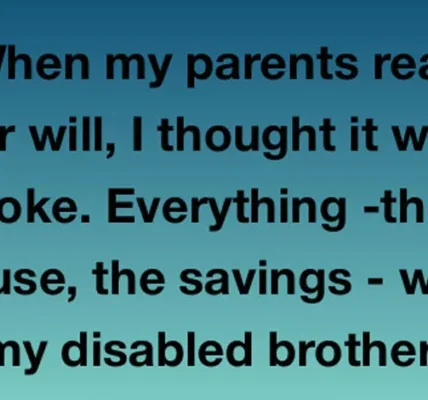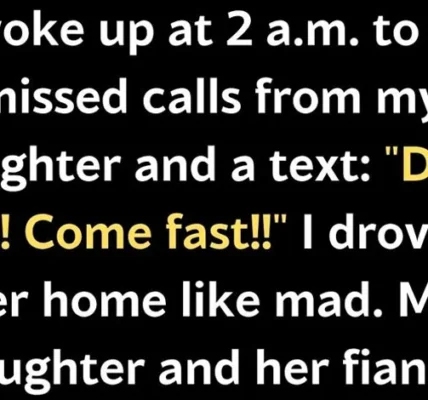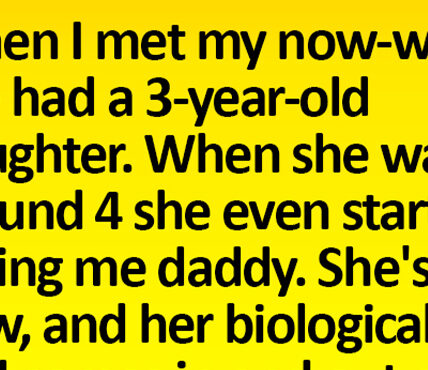My husband and I planned a one-week getaway. Thankfully, my “sweet” sister-in-law offered to move in and look after our baby. Upon our return, we were greeted by a putrid stench emanating from the guest room where she stayed. Opening the door revealed!
A pile of fast food wrappers, rotting fruit, and a used diaper wedged under the bed. The sheets were stained, the air thick with sour milk and something else—something almost metallic. It hit my nose and made my stomach turn. I covered my mouth and called for Arun, my husband.
He peeked in, grimaced, then walked away muttering, “What the hell did she do in here?”
I wasn’t even mad yet. I was stunned. We had left her our clean home, prepped meals in the fridge, extra baby wipes, and detailed instructions for our daughter Nia’s schedule. And now the guest room looked like a crime scene. Nia was asleep in her crib, safe and warm, thank God. But everything else? A mess.
The kitchen sink was full of crusty dishes. A wine glass sat on the couch’s armrest, next to an open bottle with barely a sip left. Nia’s toys were scattered, and the TV was still on—volume blaring with some trashy reality show. That wasn’t even the worst part.
I found Nia’s baby monitor unplugged.
That’s when my chest got tight. I had an image of her crying alone in her crib for hours while my sister-in-law, Kavya, lay passed out with her phone. I knocked on the bathroom door. No answer. The apartment was too quiet. I finally found her asleep on the patio chair, wrapped in a blanket like a cocoon, earbuds in.
I tapped her shoulder. She startled awake.
“Oh my God! You’re back early!”
“It’s Saturday night,” I said, “We told you we’d be home before dinner.”
Kavya yawned and shuffled inside, acting like this was normal. No apology. No explanation. I glanced at her phone and noticed the screen was open to Instagram—she’d posted a dozen selfies of her “solo mom week” like she was the Mother Teresa of babysitting.
“You unplugged the baby monitor,” I said quietly.
She blinked. “Oh, yeah. The light kept flashing. I couldn’t sleep.”
I just stared at her. Arun stepped between us, rubbing the back of his neck. “Look, it’s late. Let’s all sleep, and we’ll talk tomorrow.”
But I couldn’t sleep. I lay next to my daughter’s crib, watching her little chest rise and fall. I felt guilt, anger, and something colder—betrayal. Kavya had always been flighty. Fun at parties, terrible at planning. She’d bounced from job to job, always “figuring herself out.” But she talked a good game. Said she loved Nia “like her own.” When we asked if she was sure she could manage the week, she acted offended.
Now I was wondering what else we hadn’t seen.
The next morning, Kavya packed her duffel and gave us both a hug like nothing was wrong. She didn’t mention the mess. Just said, “Nia was a dream! Barely cried. I’ll miss her!” Then she was out the door.
Arun looked torn. “She helped us out. We should be grateful.”
I shook my head. “No. We left our child in her care. She treated it like a joke.”
I spent the next two days cleaning and rewashing everything—Nia’s clothes, her sheets, the guest bed. Then I found Kavya’s old phone charger under the crib. And behind the glider? Two empty White Claw cans.
That’s when something broke in me.
I sat Arun down and told him I didn’t feel safe letting her babysit again. He hesitated. “You think she’d hurt Nia?”
“I think she doesn’t take anything seriously,” I said. “And this isn’t about being messy. This is about her choosing convenience over safety.”
He went quiet. “Okay. No more babysitting. We’ll find someone else.”
I thought that would be the end of it.
Two weeks later, Kavya texted us a cute meme about “cool aunt energy.” I didn’t respond. Then she messaged Arun directly asking if she could “swing by for a quick cuddle with my peanut.” We were both working from home that day, so he said fine. I kept my camera on for meetings, but I was hyper-aware.
She arrived late morning with a sugary coffee drink in hand, talking loudly, acting like she owned the place. When she picked up Nia, I saw it—the baby stiffened. Her little body didn’t melt into Kavya’s shoulder like usual. Her eyes darted around. She whimpered.
Kavya laughed. “Oh, she’s being dramatic!”
But I knew that sound. It wasn’t drama. It was fear.
I walked over, gently took Nia back, and smiled tightly. “She’s a bit overstimulated today. Maybe next time.”
Kavya looked confused, like I’d just spoken a foreign language. “Oh. Okay…”
She left within minutes. No drama. But that moment stuck with me.
Then came the twist.
About a month after that, I got a call from our neighbor downstairs, Mrs. Halstrom. She’s a kind widow, always sweet with Nia. She said, “I didn’t want to meddle, but something’s been bothering me. When your sister-in-law was staying there… did you know she had people over?”
My stomach dropped. “No. What kind of people?”
“Well, I heard at least two different men’s voices, on separate nights. Loud music. Laughter. One night there was even some yelling. I nearly called the police, but I wasn’t sure.”
My skin crawled. Nia had been sleeping just one room away.
I told Arun that night. He sat down slowly, rubbing his temples. “She turned our apartment into a party zone while we were away. With our baby here.”
We didn’t tell Kavya what we knew. We just stopped responding to her messages. She noticed.
Two weeks later, we got a long text. Full of guilt-trippy lines like “I gave up my whole week for you” and “You don’t even say thank you anymore.”
Arun wanted to reply. I asked him to let me.
I typed slowly. I told her we knew about the drinking, the guests, the unplugged monitor. That we appreciated her time, but she had violated our trust. And that for now, we needed space.
She didn’t respond.
But karma, it turns out, doesn’t need an audience.
Three months passed. Then one afternoon, Arun got a call from their mom in Mumbai. Kavya had been scammed.
She’d met someone on a dating app, moved in with him after a month, and “invested” her savings into his “wellness start-up.” It wasn’t a start-up. It was a front. He ghosted her. Took her money. And worst of all—she’d used part of a small trust their dad had left for both siblings. Arun’s half was untouched. Hers was gone.
I won’t pretend I was happy to hear that. But I wasn’t shocked.
She moved back in with her mom for a while. Got off Instagram. Went silent for nearly six months.
Then, one day, she sent a letter. A real, hand-written letter.
It started with: “I don’t expect forgiveness. But I owe you a real apology.”
She admitted she hadn’t been in a good place that week she babysat. She’d been drinking more than usual. She had invited people over because she felt lonely and “needed to feel young.” She said she unplugged the monitor because “the noise of a crying baby made me panic” and she was too ashamed to say anything. She called herself selfish.
But the part that stuck with me was this:
“I wanted so badly to prove I could handle something important. But I was lying to myself. And I put your daughter at risk. I’ll never forgive myself for that. But I want to earn back your trust, one day, if you ever let me try.”
I cried reading it.
I read it out loud to Arun. He didn’t say anything for a while.
We didn’t respond right away. I think both of us needed time to let the anger cool and the meaning settle. It wasn’t just an apology. It was her first sign of growth. Real growth. Not some shiny Instagram quote or humblebrag.
Three months later, she invited us for tea at her new studio rental. No wine bottles. No loud music. Just her, two cups, and a plate of simple cardamom biscuits. She had started working as a receptionist at a dental office. Said she wanted to try small, stable things before chasing big dreams again.
Nia was now walking, babbling, full of opinions. We brought her along. She clung to my leg at first, eyeing Kavya suspiciously.
Kavya sat on the floor, held out a stuffed toy, and waited. Didn’t push. After ten minutes, Nia took the toy.
It wasn’t a movie moment. No dramatic music. But it was a start.
We don’t leave Nia alone with her. Not yet. Maybe not ever. But Kavya visits now and then. Always sober. Always careful. And always grateful.
Sometimes people screw up badly. So badly you don’t think they’ll ever own it. But some do. Eventually. After they’ve lost something real.
I guess that’s the thing about trust—it breaks quietly but rebuilds loudly, one honest step at a time.
If this hit home for you, or you’ve ever had to set hard boundaries with someone you love—share this. You’re not alone. ❤️



